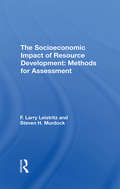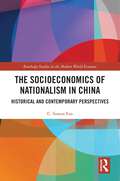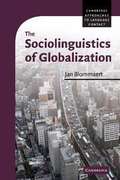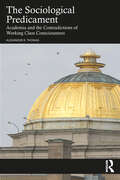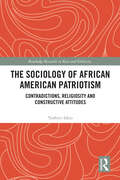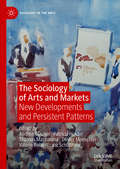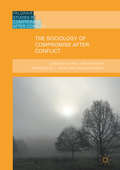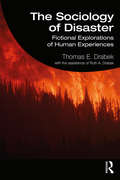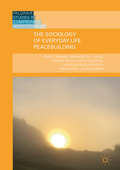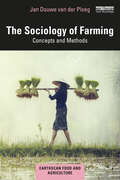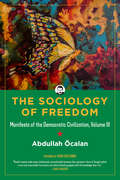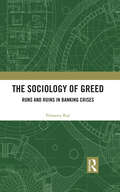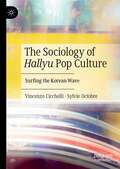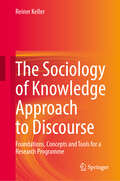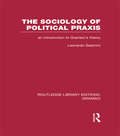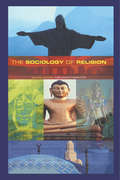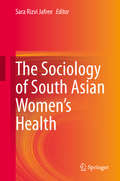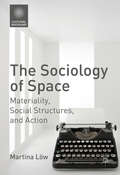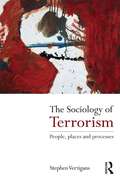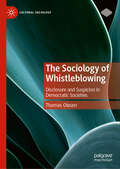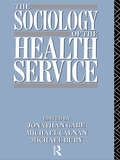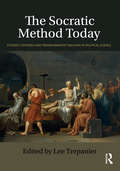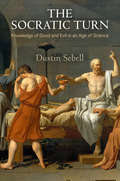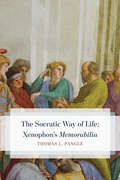- Table View
- List View
The Socioeconomic Impact Of Resource Development: Methods For Assessment
by Steve H. Murdock F. Larry Leistritz F Larry LeistritzLarge-scale industrial and energy-development projects are profoundly affecting the social and economic climate of rural areas across the nation, creating a need for extensive planning information, both to prepare for the effects of such developments and to meet state and federal environmental impact assessment requirements. This book examines alternative methods of modelling the economic, demographic, public service, fiscal, and social impacts of major development projects. The authors provide a synthesis of the conceptual bases, estimation techniques, data requirements, and types of output available, focusing on models that address multiple impact dimensions and produce information at the county and subcounty levels. They also look at the kind of data each model produces in each impact category.
The Socioeconomics of Nationalism in China: Historical and Contemporary Perspectives (Routledge Studies in the Modern World Economy)
by C. Simon FanThis book analyzes Chinese nationalism from the perspective of social economics. It posits a conceptual framework in which national status is treated as a "luxury" while material consumption is considered as a "necessity" in people’s preferences, which implies that popular nationalism tends to increase with economic development. The book extensively uses the tools of game theory and behavioral economics to analyze inter-ethnical and international conflicts in historical and contemporary China. The author’s economic approach to the subject of nationalism brings fresh and critical insights into the Chinese historical events and relations with foreign countries. For example, it helps resolve the following puzzles: Why did most Chinese support an ethnic minority, the Manchus, to be their ruler after the collapse of the Ming dynasty? In the Boxer Rebellion, why did the Qing dynasty declare war against more than eight foreign powers when it knew well that any of the countries could defeat China easily? What are the fundamental causes of the 1962 Sino-Indian War and the 1979 Sino-Vietnamese War? Who is responsible for the bombing of the Chinese Embassy in Belgrade? This book attempts to answer the questions based on the theories of social economics and rational choice, which will interest those researching on nationalism, China studies, international relations, history and political economy.
The Sociolinguistics of Globalization
by Jan BlommaertHuman language has changed in the age of globalization: no longer tied to stable and resident communities, it moves across the globe, and it changes in the process. The world has become a complex 'web' of villages, towns, neighbourhoods and settlements connected by material and symbolic ties in often unpredictable ways. This phenomenon requires us to revise our understanding of linguistic communication. In The Sociolinguistics of Globalization Jan Blommaert constructs a theory of changing language in a changing society, reconsidering locality, repertoires, competence, history and sociolinguistic inequality.
The Sociological Predicament: Academia and the Contradictions of Working Class Consciousness
by Alexander ThomasA sociological phenomenon afflicts sociology itself: academics think of themselves as the vanguard of the working class despite the fact that they are not working class, as the noble willingness to side with the oppressed contrasts scholars’ reliance on authority to bolster their politics.While there are no simple solutions to this contradiction, a necessary beginning is for sociologists (and other academics) to acknowledge the reality of their own class privilege as members of the professional-managerial class. The Sociological Predicament is then a conscious and deliberate work of professional self-loathing that traces the evolution of ideologies found in academia from the mid-twentieth century to today, which demonstrates the ways in which biases around class have given short shrift to the concerns of working class Americans in deindustrialized cities and towns that have ultimately turned away from and then against them.Intellectuals have not historically been on the side of the oppressed but have been instrumental in developing ideologies that sustain the status quo, and this book crucially asks whether academics’ presence on the left ultimately serves conservative ends.
The Sociology of African American Patriotism: Contradictions, Religiosity and Constructive Attitudes (Routledge Research in Race and Ethnicity)
by Yoshito IshioThis book offers a sociological examination of the reasons why African Americans feel love toward their country in spite of continuing to perceive or experience racial prejudice and discrimination against themselves and other African Americans. Dr. Ishio conducted face-to-face, in-depth interviews with college-educated African Americans in Texas between 2014 and 2015. The main conclusion of this study is that contradictory trends marked by persistent racism and racial progress, combined with the effects of Christian faith/practice fostered in the Black Church and the effects of foundational principles of the United States, have molded a distinctive form of patriotism among African Americans for whom this country is their homeland. This book presents an insightful analysis by a Japanese sociologist.Every important finding in this book is supported by interviewees’ statements, making it easy for readers to follow the points being made and to understand African Americans’ perspectives. Numerous interviewees’ statements are judiciously inserted so that readers can virtually “hear” interviewees’ voices describing their experiences and views.A unique study of African Americans and their feelings of patriotism, it will appeal to scholars and researchers with interests in the sociology of race and ethnicity, Black studies, and the sociology of religion.
The Sociology of Arts and Markets: New Developments and Persistent Patterns (Sociology of the Arts)
by Thomas Mazzurana Olivier Moeschler Andrea Glauser Patricia Holder Valérie Rolle Franz SchultheisThis edited collection offers an in-depth analysis of the complex and changing relationship between the arts and their markets. Highly relevant to almost any sociological exploration of the arts, this interaction has long been approached and studied. However, rapid and far-reaching economic changes have recently occurred. Through a number of new empirical case studies across multiple artistic, historic and geographical settings, this volume illuminates the developments of various art markets, and their sociological analyses. The contributions include chapters on artistic recognition and exclusion, integration and self-representation in the art market, sociocultural changes, the role of the gallery owner, and collectives, rankings, and constraints across the cultural industries. Drawing on research from Japan, Switzerland, France, Italy, China, the US, UK, and more, this rich and global perspective challenges current debates surrounding art and markets, and will be an important reference point for scholars and students across the sociology of arts, cultural sociology and culture economy.
The Sociology of Compromise after Conflict (Palgrave Studies in Compromise after Conflict)
by John D. BrewerThis book introduces a new and original sociological conceptualization of compromise after conflict and is based on six-years of study amongst victims of conflict in Northern Ireland, South Africa and Sri Lanka, with case studies from Sierra Leone and Colombia. A sociological approach to compromise is contrasted with approaches in Moral and Political Philosophy and is evaluated for its theoretical utility and empirical robustness with in-depth interview data from victims of conflicts around the globe. The individual chapters are written to illustrate, evaluate and test the conceptualization using the victim data, and an afterword reflects on the new empirical agenda in victim research opened up by a sociological approach to compromise. This volume is part of a larger series of works from a programme advancing a sociological approach to peace processes with a view to seeing how orthodox approaches within International Relations and Political Science are illuminated by the application of the sociological imagination.
The Sociology of Disaster: Fictional Explorations of Human Experiences
by Thomas E. DrabekIn a book as illuminating as it is captivating, Thomas E. Drabek presents an in-depth analysis of the emotional impacts of disaster events and the many ripple effects that follow. Through the technique of storytelling, a series of nine fictional stories where characters experience actual disasters of different types throughout the United States illustrate the vulnerabilities and resilience to enhance the readers understanding of disaster consequences. Designed for classroom use, each story is followed by an "Analysis" section wherein discussion and research paper topics are recommended. These highlight links to published research findings. A "References" section details citations for all works included. Brief commentary in a "Notes" section adds further connections to other disasters and relevant research studies. The Sociology of Disaster is an important innovation in disaster education and will become an invaluable resource within universities and colleges that offer degrees in emergency management at both the undergraduate and graduate levels.
The Sociology of Everyday Life Peacebuilding (Palgrave Studies in Compromise after Conflict)
by John D. Brewer Bernadette C. Hayes Francis Teeney Katrin Dudgeon Natascha Mueller-Hirth Shirley Lal WijesingheThis book uses in-depth interview data with victims of conflict in Northern Ireland, South Africa and Sri Lanka to offer a new, sociological conceptualization of everyday life peacebuilding. It argues that sociological ideas about the nature of everyday life complement and supplement the concept of everyday life peacebuilding recently theorized within International Relations Studies (IRS). It claims that IRS misunderstands the nature of everyday life by seeing it only as a particular space where mundane, routine and ordinary peacebuilding activities are accomplished. Sociology sees everyday life also as a mode of reasoning. By exploring victims’ ways of thinking and understanding, this book argues that we can better locate their accomplishment of peacebuilding as an ordinary activity. The book is based on six years of empirical research in three different conflict zones and reports on a wealth of interview data to support its theoretical arguments. This data serves to give voice to victims who are otherwise neglected and marginalized in peace processes.
The Sociology of Farming: Concepts and Methods (Earthscan Food and Agriculture)
by Jan Douwe van der PloegThis book provides a detailed and comprehensive introduction to the concepts and methods of the sociology of farming. The sociology of farming focuses on co-production: the ongoing interaction and mutual transformation of the natural and the social (of ‘human and living nature’) which requires putting the farm labour process centre stage. While there are many books which discuss food and agriculture, this book is different: it delves into the methods and concepts used and presents a comprehensive conceptual framework and the associated methods for research to give students and researchers of agriculture and rural studies a solid set of tools for unravelling the complexities of farming and rural life. Importantly, these tools also empower us to design new ways forward. A wide array of case studies, as wide-ranging as Brazil, Peru, China, the Netherlands, Italy and Guinea Bissau, help readers to grasp the commonalities that underlie strongly diversified and divided rural worlds. The book lists over two hundred basic concepts and includes boxes that discuss the main methods of the sociology of farming. This textbook is essential reading for students and scholars of food and agriculture, agrarian studies, rural development, food and farming systems, peasant studies and environmental sociology.
The Sociology of Freedom: Manifesto of the Democratic Civilization
by Abdullah ÖcalanWhen scientific socialism, which for many years was implemented by Abdullah Öcalan and the Kurdistan Workers' Party (PKK), became too narrow for his purposes, Öcalan answered the call for a radical redefinition of the social sciences. Writing from his prison cell, he offered a new and astute analysis of what is happening to the Kurdish people, their freedom movement, and future prospects for humanity. The Sociology of Freedom is the third volume of a five-volume work titled The Manifesto of the Democratic Civilization. The general aim of the earlier volumes was to clarify what power and capitalist modernity entailed. Here, Öcalan presents his thesis of the Democratic Civilization, based on his criticism of Capitalist Modernity. This volume reveals the remarkable range of one of the Left's most original thinkers with topics such as existence and freedom, nature and philosophy, anarchism and ecology. Recognizing the need for more than just a critique, he has advanced what is the most radical, far-reaching definition of democracy today and argues that a democratic civilization, as an alternative system, already exists, though systemic power and knowledge structures, along with a perverse sectarianism, do not allow it to be seen. This monumental work gives profuse evidence of his position as one of the most influential thinkers of our day.
The Sociology of Greed: Runs and Ruins in Banking Crises
by Prasanta RayThe Sociology of Greed examines crises in financial institutions such as banks from the vantage point of the greed of the people at their helm. It offers an intensive analysis of the banking crises under the conditions of colonial capitalism in early twentieth-century Bengal that led to institutional and social collapse. Breaking new ground, the book looks at the moral economy of capitalism and money culture by focusing on the victims of banking crises, hitherto unexplored in Western empirical research. Through sociological analyses of political economy, it seamlessly combines archival records, survey and statistical data with literary narratives, realist fiction and performing arts to recount how the greed of bank owners and managers ruined their institutions as well as common people. It argues that greed turns perilous when the state and the market facilitate its agency, and it examines the contexts and histories, the indifference of the fledgling colonial state, feeble political response, and the consequences for those who were impacted and the losses, especially the refugees, the lower-middle class and women. The volume also re-composes relevant elements of Western sociological scholarship from classical theories to early twenty-first-century financial sociology. An insightful account of the social history of banking in India, this book will greatly interest researchers and scholars in sociology, economics, history and cultural studies.
The Sociology of Hallyu Pop Culture: Surfing the Korean Wave
by Vincenzo Cicchelli Sylvie OctobreCombining global, media, and cultural studies, this book analyzes the success of Hallyu, or the "Korean Wave” in the West, both at a macro and micro level, as an alternative pop culture globalization. This research investigates the capitalist ecosystem (formed by producers, institutions and the state), the soft power of Hallyu, and the reception among young people, using France as a case study, and placing it within the broader framework of the 'consumption of difference.' Seen by French fans as a challenge to Western pop culture, Hallyu constitutes a material of choice for understanding the cosmopolitan apprenticeships linked to the consumption of cultural goods, and the use of these resources to build youth’s biographical trajectories. The book will be relevant to researchers, as well as undergraduate and postgraduate students in sociology, cultural studies, global studies, consumption and youth studies.
The Sociology of Knowledge Approach to Discourse: Foundations, Concepts and Tools for a Research Programme
by Reiner KellerIn this updated version of a contemporary classic of discourse research, Reiner Keller develops the theoretical and methodological foundations of the Sociology of Knowledge Approach to Discourse (SKAD). Translated from the original German into English for the first time, this book brings together two previously unconnected domains of knowledge analysis in social science: the rich traditions of sociology of knowledge and symbolic interactionism on one hand and the works of discourse studies, especially in relation to Michel Foucault, on the other. It presents a critical discussion of key developments in sociology of knowledge, symbolic interactionist, and related interpretive approaches, explains the communicational turn of recent work in the field, and examines how traditions within sociology of knowledge shifted focus or converged over time. Following this, the book discusses the development of discourse theory and discourse analysis since the 1960s, including critical discourse analysis, hegemony analysis, or cultural studies approaches. Embarking from a profound reconstruction of Michel Foucault’s work, the book then sets its own distinctive course by integrating major elements of Foucault’s perspective with the sociology of knowledge. Along this path, Reiner Keller establishes the heuristics and methodology for a sociology of knowledge approach to discourse, providing a comprehensive research programme for the study of social relations of knowledge and politics of knowledge. Since its first publication in 2005, SKAD has informed a multitude of studies worldwide and across several academic disciplines. Today it can be considered as one of the major perspectives in discourse research in social science and beyond.
The Sociology of Political Praxis (RLE (RLE (RLE (RLE (RLE (RLE (RLE (RLE: Gramsci): An Introduction to Gramsci's Theory
by Leonardo SalaminiThis volume analyses the philosophical nature of Gramsci’s Marxism and its Hegelian source, the radical critique of the economistic tradition and the original analyses of the role of superstructures, ideology, consciousness and subjectivity in the revolutionary process. It relates the central themes of Gramsci’s writings, such as hegemony, ‘historical blocs’, the role of intellectuals and political praxis, to the more peripheral ones, such as science, language, literature and art. The introduction includes a brief intellectual biography of Gramsci.
The Sociology of Postmarxism (Routledge Advances in Sociology)
by Richard HowsonPostmarxism is often depicted as a point of intersection for a set of inter-disciplinary theories that are in themselves complex and dense. Bringing the postmarxist theory of Ernesto Laclau into the field of political sociology through a close reading and analysis of postmarxism and its relationship to ‘the social’, A Sociology of Postmarxism develops key postmarxist arguments in an engaging and sociologically applicable way. Indeed, through a threefold method of analysis, Howson first unpacks the relationship between ‘the social’ and ‘the political’ by analysing key allied theories to show where the points of connection occur. This is then followed by an insightful analysis of the key features of postmarxist theory such as antagonism and the inevitability of social dislocation, the political importance of hegemony; and the empty signifier thesis and equivalence to show how such theory can be applied at a sociological level. Finally, through the use of sociological categories such as masculinities, migration and social capital, the foregoing theoretical analyses are synthesised to show the social nature of postmarxism and particularly in the context of aspiration and co-operation. This enlightening volume will appeal to undergraduate and postgraduate students, as well as postdoctoral researchers who are interested in fields such as Political Sociology, Post Marxist Political Theory and Social Theory.
The Sociology of Religion: Theoretical and Comparative Perspectives
by Malcolm B. HamiltonThis clear introduction to the sociology of religion combines a discussion of key theorists with a modern emphasis on the diversity of religious beliefs and practices. Malcolm Hamilton's expanded second edition brings the discussion fully up-to-date, and extends its material on secularization and religious sects, giving a broad comparative view. Drawing on the insights of history, anthropology and sociology, he surveys classic and contemporary theory to give a full picture of the variety and scope of theoretical perspectives.
The Sociology of South Asian Women’s Health
by Sara Rizvi JafreeThis contributed volume is the first-known collection of essays that brings together scholarly review, critiques, and primary and secondary data to assess how sociocultural factors influence health behavior in South Asian women. The essays are authored by working scholars or healthcare practitioners from Bangladesh, India, and Pakistan. In the chapters, the contributors acknowledge social, economic, and environmental factors to recommend improved interventions and health policy for women of the region.Studies on South Asian women’s health have targeted clinical evidence, with less attention on social and environmental factors driving health recovery and health outcomes. The South Asian region, more than any other part of the world, is driven by traditional and cultural forces that are possibly the most significant factors determining a woman’s health awareness and her rights to adopt healthy behavior or pursue health recovery. Women of the region share a common culture and political history, and there are benefits to understanding their problems collectively in order to design joint improvements in health policy for women.Salient, but neglected, socio-political areas that influence health behavior and health outcomes in women of the region are covered in the chapters including:Oral Narrations of Social Rejection Suffered by South Asian Women with Irreversible Health Conditions Women’s Role in Decision-Making for Health Care in South Asia Poverty, Health Coverage, and Credit Opportunities for South Asian WomenRefugee, Displaced, and Climate-Affected Women of South Asia and Their Health ChallengesThe Political Sociology of South Asian Women’s HealthThe Sociology of South Asian Women’s Health is a useful resource for students, researchers, and academicians, especially those interested in public health, gender, social policy, and occupational management, as well as healthcare practitioners, administrators, health and public policy-makers, government officers, and scholars of South Asian studies.
The Sociology of Space: Materiality, Social Structures, and Action (Cultural Sociology)
by Martina LöwIn this book, the author develops a relational concept of space that encompasses social structure, the material world of objects and bodies, and the symbolic dimension of the social world. Löw’s guiding principle is the assumption that space emerges in the interplay between objects, structures and actions. Based on a critical discussion of classic theories of space, Löw develops a new dynamic theory of space that accounts for the relational context in which space is constituted. This innovative view on the interdependency of material, social, and symbolic dimensions of space also permits a new perspective on architecture and urban development.
The Sociology of Terrorism: People, Places and Processes
by Stephen VertigansThis is the first terrorism textbook based on sociological research. It adopts an innovative framework that draws together historical and modern, local and global, and social processes for a range of individuals, groups and societies. Individual behaviour and dispositions are embedded within these broader relationships and activities, allowing a more holistic account of terrorism to emerge. In addition, the shifting forms of identification and interwoven attitudes to political violence are discussed in order to explain the emergence, continuation, and end of ‘terrorist’ careers. The book draws on examples from across the discursive spectrum, including religious, ‘red’ and ‘black’ racialist, nationalist, and trans-national. It also spans territories as diverse as Chechnya, Germany, Italy, Japan, Northern Ireland, Pakistan, Palestine, Saudi Arabia, South America, the UK, and the US.
The Sociology of Whistleblowing: Disclosure and Suspicion in Democratic Societies (Cultural Sociology)
by Thomas OlesenThis book views the whistleblower as a key character in democratic societies. It argues that whistleblowing is likely to become an increasingly important form of action in the coming years. Whistleblowers are unique actors in our democracies because they disclose wrongdoing from the inside, as organization employees. With their privileged access and specialized knowledge, they contribute powerfully to public, democratic, and moral debates in a way that no one else can. The book explores whistleblowers&’ relation to democracy by connecting them to values such as suspicion, openness, honesty, and critique. While anchored in a cultural sociological tradition, the book draws on several different sociological thinkers such as Niklas Luhmann, Ulrich Beck, Anthony Giddens, Jürgen Habermas, and Pierre Bourdieu. Themes in the book include the democratic history of the whistleblower, normalized wrongdoing in organizations, the place of whistleblowers in popular culture, and Big Tech whistleblowing. This book will be of interest to readers in fields including political sociology, public sociology, the sociology of work, and organization studies.
The Sociology of the Health Service
by Michael Bury Jonathan Gabe Michael CalnanThe Sociology of the Health Service responds directly to the need to develop a sociological analysis of current health policy. Topics covered vary from privatisation and health service management to health education and the politics of professional power. Also included is an histroical review of sociology's contributions to health policy and proposals for an agenda for sociological health policy research in the 1990s.
The Socratic Method Today: Student-Centered and Transformative Teaching in Political Science
by Lee TrepanierThis exciting new textbook provides a sophisticated examination of the Socratic method for teaching political science students in higher education. It shows how the Socratic method is employed in the Platonic dialogs, compares its transformative approach to other student-centered teaching philosophies, and addresses the challenges of adopting the Socratic method in the contemporary classroom. The book is divided into three sections that integrate these practical aspects on the Socratic method with the theoretical considerations of Socratic philosophy while also addressing contemporary concerns about teaching and learning in higher education. Section One explores how the Socratic method is portrayed by Socrates in Plato’s dialogs. Section Two compares the Socratic method with modern and contemporary accounts of teaching and learning. Section Three examines some of the contemporary challenges of practicing the Socratic method in the university classroom today and how teachers can overcome them. Written in a clear and engaging style, this timely intervention is essential reading for upper undergraduate students enrolled in courses that specialize in pedagogical techniques, political theory, Socratic philosophy, and law.
The Socratic Turn
by Dustin SebellThe Socratic Turn addresses the question of whether we can acquire genuine knowledge of good and evil, right and wrong. Reputedly, Socrates was the first philosopher to make the attempt. But Socrates was a materialistic natural scientist in his youth, and it was only much later in life--after he had rejected materialistic natural science--that he finally turned, around the age of forty, to the examination of ordinary moral and political opinions, or to moral-political philosophy so understood.Through a consideration of Plato's account of Socrates' intellectual development, and with a view to relevant works of the pre-Socratics, Xenophon, Aristotle, Hesiod, Homer, and Aristophanes, Dustin Sebell reproduces the course of thought that carried Socrates from materialistic natural science to moral-political philosophy. By doing so, he seeks to recover an all but forgotten approach to the question of justice, one still worthy of being called scientific.
The Socratic Way of Life: Xenophon’s “Memorabilia”
by Thomas L. PangleThe Socratic Way of Life is the first English-language book-length study of the philosopher Xenophon’s masterwork. In it, Thomas L. Pangle shows that Xenophon depicts more authentically than does Plato the true teachings and way of life of the citizen philosopher Socrates, founder of political philosophy. In the first part of the book, Pangle analyzes Xenophon’s defense of Socrates against the two charges of injustice upon which he was convicted by democratic Athens: impiety and corruption of the youth. In the second part, Pangle analyzes Xenophon’s account of how Socrates’s life as a whole was just, in the sense of helping through his teaching a wide range of people. Socrates taught by never ceasing to raise, and to progress in answering, the fundamental and enduring civic questions: what is pious and impious, noble and ignoble, just and unjust, genuine statesmanship and genuine citizenship. Inspired by Hegel’s and Nietzsche’s assessments of Xenophon as the true voice of Socrates, The Socratic Way of Life establishes the Memorabilia as the groundwork of all subsequent political philosophy.
